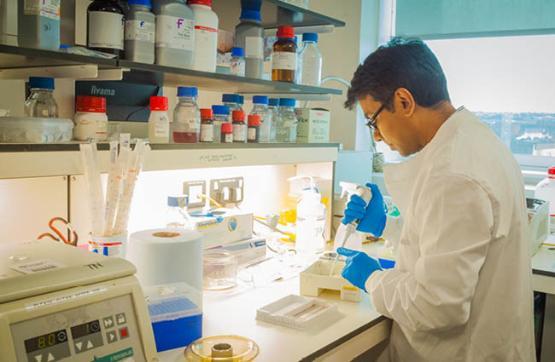Grant could help diagnose incurable lung condition

University of Bradford researchers have won £20K funding to develop a new means of diagnosing a life-limiting lung condition.
Pulmonary Arterial Hypertension (PAH) is an incurable condition affecting around 7,000 people in the UK. It is caused by a narrowing of the arteries supplying blood to the lungs, leading to high blood pressure and eventually to heart failure. But it is very difficult to diagnose, since its main symptoms of shortness of breath and tiredness are similar to many other heart conditions.
The grant, awarded to Dr Talat Nasim in the School of Pharmacy and Medical Science, will be used to develop an accurate diagnostic device for clinicians. The research will work with biomarkers that Dr Nasim has already identified in previous research with collaborators at the University of Cambridge and Kings College London.
There is currently no single specific test for PAH. Those suspected to have the condition undergo a series of tests including chest X-rays, electrocardiograms and echocardiograms, perfusion lung scans, pulmonary artery tests and blood tests. MRI scans, cardiac catheterization and spirometry may also be needed.
There is a typical delay of about three years between symptoms emerging and a diagnosis. By the time PAH is confirmed, most patients will require intensive medical care, with heart-lung transplantation the final option. Current therapies can cost up to £100,000 per patient.
Dr Nasim said: “We hope our diagnostic device will allow us to diagnose PAH at an earlier stage, leading to better treatment options for patients. An accurate diagnostic would transform disease management, leading to fewer patients being hospitalised and more patients ultimately surviving.”
The team’s research has centred around the role played in PAH by mutations in a gene known as BMPR-II. It affects two important processes in arteries supplying blood to the lungs: firstly, it causes the cells in these arteries to reproduce too quickly; and secondly it reduces the process of cell death. Together these processes cause the blood vessels to become narrow or blocked.
The researchers know that the mutated gene affects a protein called Bcl-x, which controls the proteins that manage the process of cell death. Now, they want to explore whether the presence of Bcl-x and associated proteins can be used to accurately identify PAH in patients.
The research team will be testing one of the proteins with controls, to confirm if what they have found in preclinical work also shows up in patient data. If no single diagnostic is sensitive and selective enough to be used as a clinical tool, other biomarkers will be selected to make the diagnostic stronger.
Dr Nasim is also speaking to other research groups in the UK, Japan and Turkey who are working on the disorder and hopes to persuade them to join the effort to look for the best biomarkers for PAH.
He said: “We are delighted to receive this grant which will allow us to take the crucial first step to diagnosing this devastating condition.”
The Proof of Feasibility grant was awarded by Grow MedTech, a collaboration between six universities in the north of England, including the University of Bradford, and which is funded through the Research England Connecting Capability Fund.
